

|
|
|
equation.h File ReferenceDefinition of the Tequation type and the associated functions. More... #include "boolean.h"#include "interval.h"#include "variables.h"#include "variable_set.h"#include "monomial.h"#include "linear_constraint.h"#include "csmapping.h"#include <stdlib.h>Go to the source code of this file.
Detailed DescriptionDefinition of the Tequation type and the associated functions.
Definition in file equation.h. Define Documentation
Maximum number of terms to be used in the simplifications. This variable is defined for experimental purposes. Do not use a value larger than 1. Definition at line 31 of file equation.h. Referenced by IsSimplificable(), and SimplifyCuikSystem().
Initial room for monomials in an equation. It will be enlarged if necessary.
Definition at line 40 of file equation.h. Referenced by InitEquation().
One of the possible type of equations according to the type of monomials it includes.
Definition at line 51 of file equation.h. Referenced by AddEquation2Simplex(), CopyEquationInfo(), CropEquation(), DeleteEquationInfo(), ErrorDueToVariable(), SetEquationInfo(), and UpdateSplitWeight().
One of the possible type of equations according to the type of monomials it includes.
Definition at line 60 of file equation.h. Referenced by AddEquation2Simplex(), CropEquation(), and SetEquationInfo().
One of the possible type of equations according to the type of monomials it includes.
Definition at line 69 of file equation.h. Referenced by AddEquation2Simplex(), CropEquation(), and SetEquationInfo().
One of the possible type of equations according to the type of monomials it includes.
Definition at line 78 of file equation.h. Referenced by AddEquation2Simplex(), CropEquation(), and SetEquationInfo().
One of the possible type of equations according to the type of monomials it includes.
Definition at line 87 of file equation.h. Referenced by AddEquation2Simplex(), CropEquation(), and SetEquationInfo().
One of the possible type of equations according to the type of monomials it includes.
Definition at line 97 of file equation.h.
One of the possible type of equations. This is used for equations not of the types listed above.
Definition at line 106 of file equation.h. Referenced by AddEquation2Simplex(), CropEquation(), and SetEquationInfo().
Used for equations with non-assigned type, i.e., equations not fully processed.
Definition at line 115 of file equation.h.
One of the possible type of equations according its role in the cuiksytem.
Definition at line 125 of file equation.h. Referenced by AddEquation(), ErrorInSolution(), GenerateCrossProductEquations(), GenerateDotProductEquation(), GenerateGeneralNormEquation(), GenerateJointEquations(), GenerateJointRangeEquations(), InitWorldKinCS(), and IsSystemEquation().
One of the possible type of equations according its role in the cuiksytem.
Definition at line 134 of file equation.h. Referenced by AddEquation(), CoordInequalitiesHold(), GenerateWorldEquationSystems(), and IsCoordEquation().
One of the possible type of equations according its role in the cuiksytem.
Definition at line 143 of file equation.h. Referenced by AddEquation(), DummifyAndAddEquation(), GaussianElimination(), GenerateScaledParabolaEquation(), GenerateScaledSaddleEquation(), IsDummyEquation(), and UsedVarInNonDummyEquations().
One of the possible type of equations according its role in the cuiksytem. This is for equations resulting from a derivative.
Definition at line 153 of file equation.h. Referenced by DeriveEquation().
Used for equations with non assigned role yet.
Definition at line 161 of file equation.h. Referenced by AddEquation(), GetEquationTypeN(), InitEquation(), and ResetEquation().
In a Tequation, the equation relational operator is great equal. Definition at line 168 of file equation.h. Referenced by AddEquation2Simplex(), CoordInequalitiesHold(), EquationFromLinearConstraint(), ErrorInInequalities(), LinearizeSaddleEquation(), PrintEquation(), ReplaceVariableInEquation(), SetEquationCmp(), SimplexAddNewConstraint(), and SimplexExpandBounds().
In a Tequation, the equation relational operator is less equal. Definition at line 174 of file equation.h. Referenced by AddEquation2Simplex(), CoordInequalitiesHold(), EquationFromLinearConstraint(), ErrorInInequalities(), LinearizeCircleEquation(), LinearizeParabolaEquation(), LinearizeSaddleEquation(), LinearizeSphereEquation(), PrintEquation(), ReplaceVariableInEquation(), SetEquationCmp(), SimplexAddNewConstraint(), and SimplexExpandBounds().
In a Tequation, the equation relational operator is equal. Definition at line 180 of file equation.h. Referenced by AddEquation(), AddEquation2Simplex(), AddTerm2SearchCriterion(), ComputeSimpCuikSystemJacobian(), CropEquation(), CtScaleEquation(), DeriveEquation(), DummifyAndAddEquation(), EquationFromLinearConstraint(), ErrorInSolution(), GaussianElimination(), GenerateCrossProductEquations(), GenerateDotProductEquation(), GenerateGeneralNormEquation(), GenerateJointEquations(), GenerateJointRangeEquations(), GenerateScaledParabolaEquation(), GenerateScaledSaddleEquation(), GenerateTransEquationsFromBranch(), IsSimplificable(), LinearizeParabolaEquation(), LinearizeSphereEquation(), NormalizeEquation(), ParabolaEquation(), PrintEquation(), PrintMonomials(), ReplaceVariableInEquation(), SaddleEquation(), SetEquationCmp(), SimplexAddNewConstraint(), SphereEquation(), and VarScaleEquation().
In a Tequation, the equation relational operator is not definet yet. Definition at line 186 of file equation.h. Referenced by AddEquation(), EvaluateEquation(), EvaluateEquationInt(), InitEquation(), PrintEquation(), and ResetEquation(). Function Documentation
Creates an empty equation.
Definition at line 73 of file equation.c. References Tequation::cmp, INIT_NUM_MONOMIALS, InitVarSet(), Tequation::maxMonomials, Tequation::monomials, NEW, Tequation::nMonomials, NOCMP, NOTYPE_EQ, Tequation::order, Tequation::type, Tequation::value, and Tequation::vars. Referenced by AddTerm2SearchCriterion(), DummifyAndAddEquation(), EquationFromLinearConstraint(), EquationFromLinearConstraintProduct(), GenerateCrossProductEquations(), GenerateDotProductEquation(), GenerateGeneralNormEquation(), GenerateJointEquations(), GenerateJointRangeEquations(), GenerateScaledParabolaEquation(), GenerateScaledSaddleEquation(), GenerateTransEquationsFromBranch(), InitCuikSystem(), PurgeEquation(), ReplaceVariableInEquation(), and RewriteEquation().
Here is the call graph for this function:

Here is the caller graph for this function:

Removes the information stored in the equation, but does not frees the memory. It is more efficient to use ResetEquation instead of DeleteEquation plus InitEquation again.
Definition at line 306 of file equation.c. References Tequation::cmp, NOCMP, NOTYPE_EQ, Tequation::order, ResetEquationMonomials(), ResetVarSet(), Tequation::type, Tequation::value, and Tequation::vars. Referenced by UpdateCuikSystem().
Here is the call graph for this function:

Here is the caller graph for this function:

Defines a new equation from a linear constraint. Only linear constraint with a constant right-hand term can be converted to equations. For other linear constraints this funtion triggers an error.
Definition at line 92 of file equation.c. References AddCt2Monomial(), AddMonomial(), AddVariable2Monomial(), Tequation::cmp, DeleteMonomial(), EQU, Error(), GEQ, GetLinearConstraintCoefficient(), GetLinearConstraintError(), GetLinearConstraintVariable(), GetNumTermsInLinearConstraint(), INF, InitEquation(), InitMonomial(), IntervalCenter(), IntervalSize(), LEQ, LowerLimit(), UpperLimit(), and Tequation::value. Referenced by RewriteEquation().
Here is the call graph for this function:
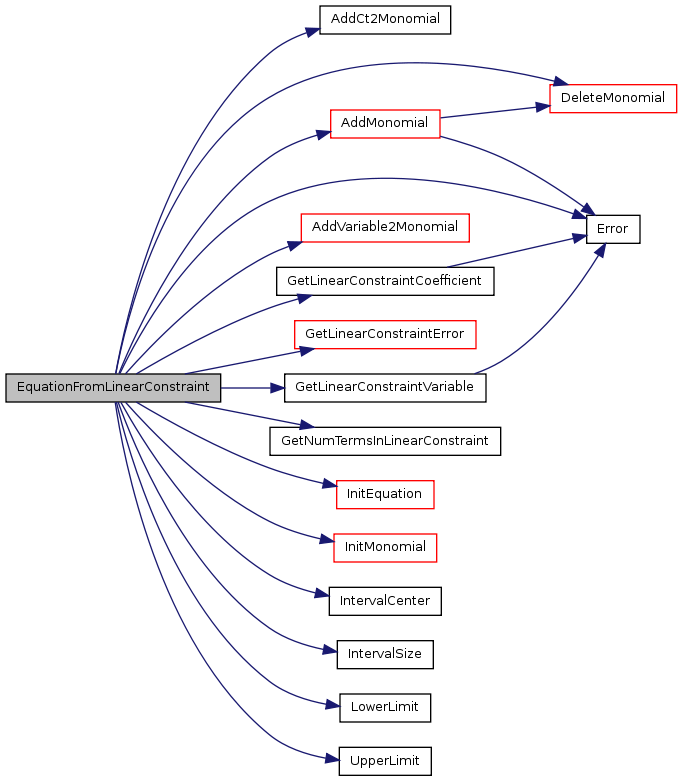
Here is the caller graph for this function:

Defines a new equation from the product of two linear constraint. Only linear constraint with a constant right-hand term are considered. For other linear constraints this funtion triggers an error.
Definition at line 142 of file equation.c. References AddCt2Monomial(), AddMonomial(), AddVariable2Monomial(), DeleteMonomial(), Error(), GetLinearConstraintCoefficient(), GetLinearConstraintError(), GetLinearConstraintVariable(), GetNumTermsInLinearConstraint(), InitEquation(), InitMonomial(), IntervalCenter(), and IntervalSize(). Referenced by RewriteEquation().
Here is the call graph for this function:
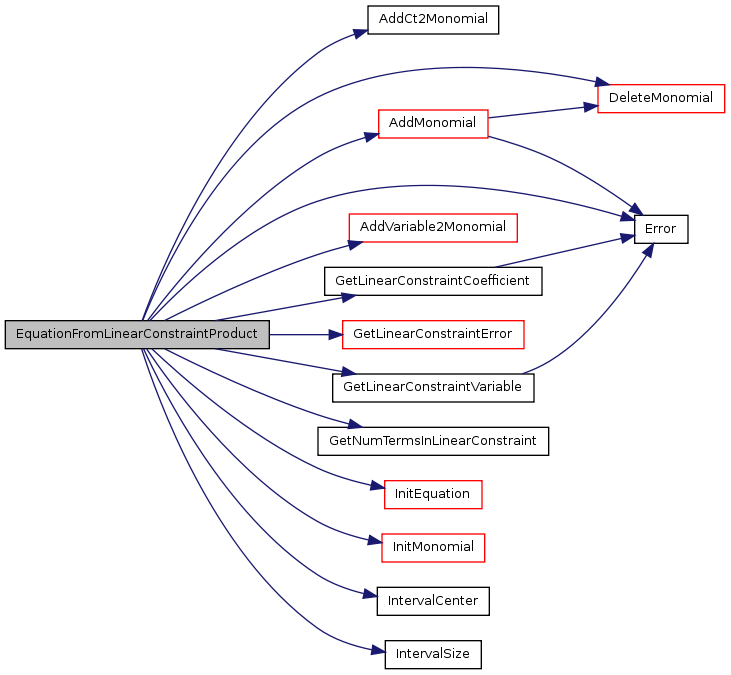
Here is the caller graph for this function:
 Creates one equation copying the information from another equation.
Definition at line 202 of file equation.c. References AddMonomial(), Tequation::cmp, InitVarSet(), Tequation::maxMonomials, Tequation::monomials, NEW, Tequation::nMonomials, Tequation::order, Tequation::type, Tequation::value, and Tequation::vars. Referenced by CopyCuikSystem(), CopyEquationInfo(), CuikSystemMerge(), GaussianElimination(), GetCSEquation(), PurgeEquation(), ReplaceVariableInEquation(), SetCSSearchMode(), and SetEquationInfo().
Here is the call graph for this function:

Here is the caller graph for this function:
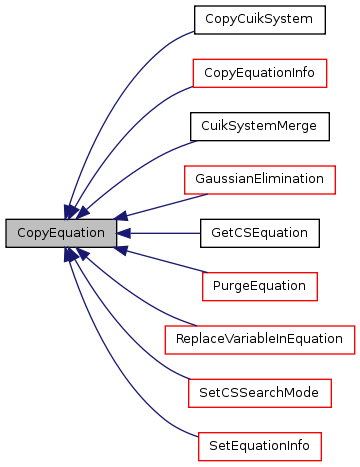 Transform an equation expressed in a given set of variables into an equation in the simplified set of variables. The relation between the two sets of variables is given by a mapping.
Definition at line 221 of file equation.c. References AccumulateEquations(), AddMonomial(), Tequation::cmp, DeleteEquation(), DeleteLinearConstraint(), EquationFromLinearConstraint(), EquationFromLinearConstraintProduct(), Error(), GetMonomialCt(), GetMonomialVariables(), GetOriginalVarRelation(), GetVariableN(), InitEquation(), MonomialOrder(), Tequation::monomials, Tequation::nMonomials, PurgeEquation(), Tequation::type, Tequation::value, and VariableSetSize(). Referenced by UpdateCuikSystem().
Here is the call graph for this function:
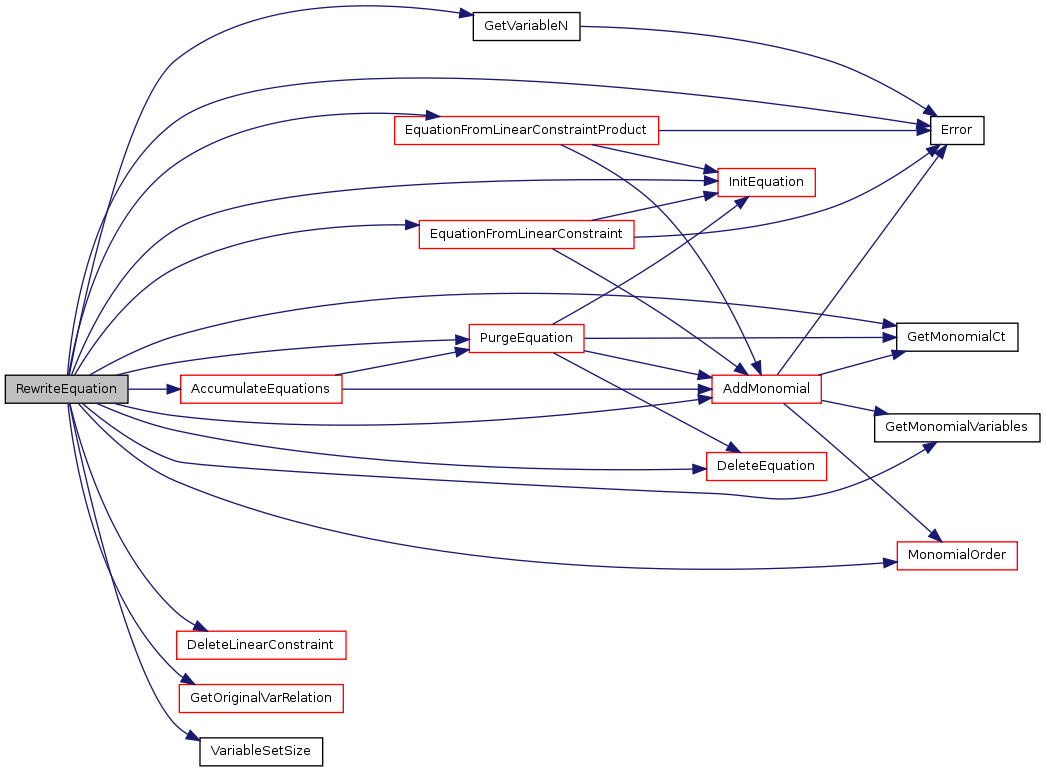
Here is the caller graph for this function:
 Adds a scaled equation to another equation.
Definition at line 290 of file equation.c. References AddCt2Monomial(), AddMonomial(), CopyMonomial(), DeleteMonomial(), Tequation::monomials, Tequation::nMonomials, PurgeEquation(), and Tequation::value. Referenced by AddTerm2SearchCriterion(), CuikSystemMerge(), GaussianElimination(), and RewriteEquation().
Here is the call graph for this function:
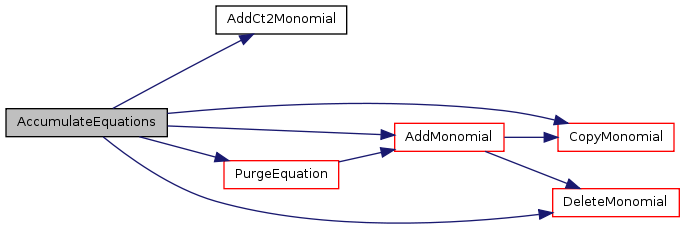
Here is the caller graph for this function:
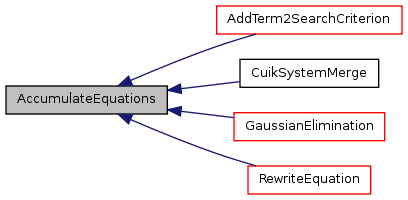
Removes a variable from an equation converting it into a constant. Note, that variables are indexed and that removing a variable shifts down the index of variables with index above the removed variable.
Definition at line 324 of file equation.c. References AddCt2LinearConstraint(), DeleteLinearConstraint(), InitLinearConstraint(), and ReplaceVariableInEquation(). Referenced by RemoveEquationsWithVar().
Here is the call graph for this function:
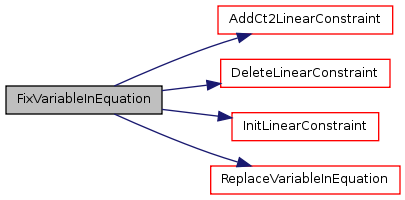
Here is the caller graph for this function:

Replaces a variable from an equation converting it to a linear combination of variables. Note, that variables are indexed and that removing a variable shifts down the index of variables with index above the removed variable.
Definition at line 344 of file equation.c. References AddCt2Monomial(), AddMonomial(), AddVariable2Monomial(), Tequation::cmp, CopyEquation(), CopyMonomial(), DeleteEquation(), DeleteMonomial(), EQU, Error(), FixVariableInMonomial(), GEQ, GetEquationCmp(), GetEquationType(), GetEquationValue(), GetLinearConstraintCoefficient(), GetLinearConstraintError(), GetLinearConstraintVariable(), GetMonomialVariables(), GetNumTermsInLinearConstraint(), GetPlaceinSet(), GetVariablePowerN(), InitEquation(), IntervalCenter(), IntervalSize(), LEQ, Tequation::monomials, Tequation::nMonomials, NO_UINT, NormalizeEquation(), SetEquationCmp(), SetEquationType(), SetEquationValue(), ShiftVarIndexes(), TRUE, Tequation::value, VariableSetSize(), and ZERO. Referenced by FixVariableInEquation(), and ReplaceVariableInEquations().
Here is the call graph for this function:
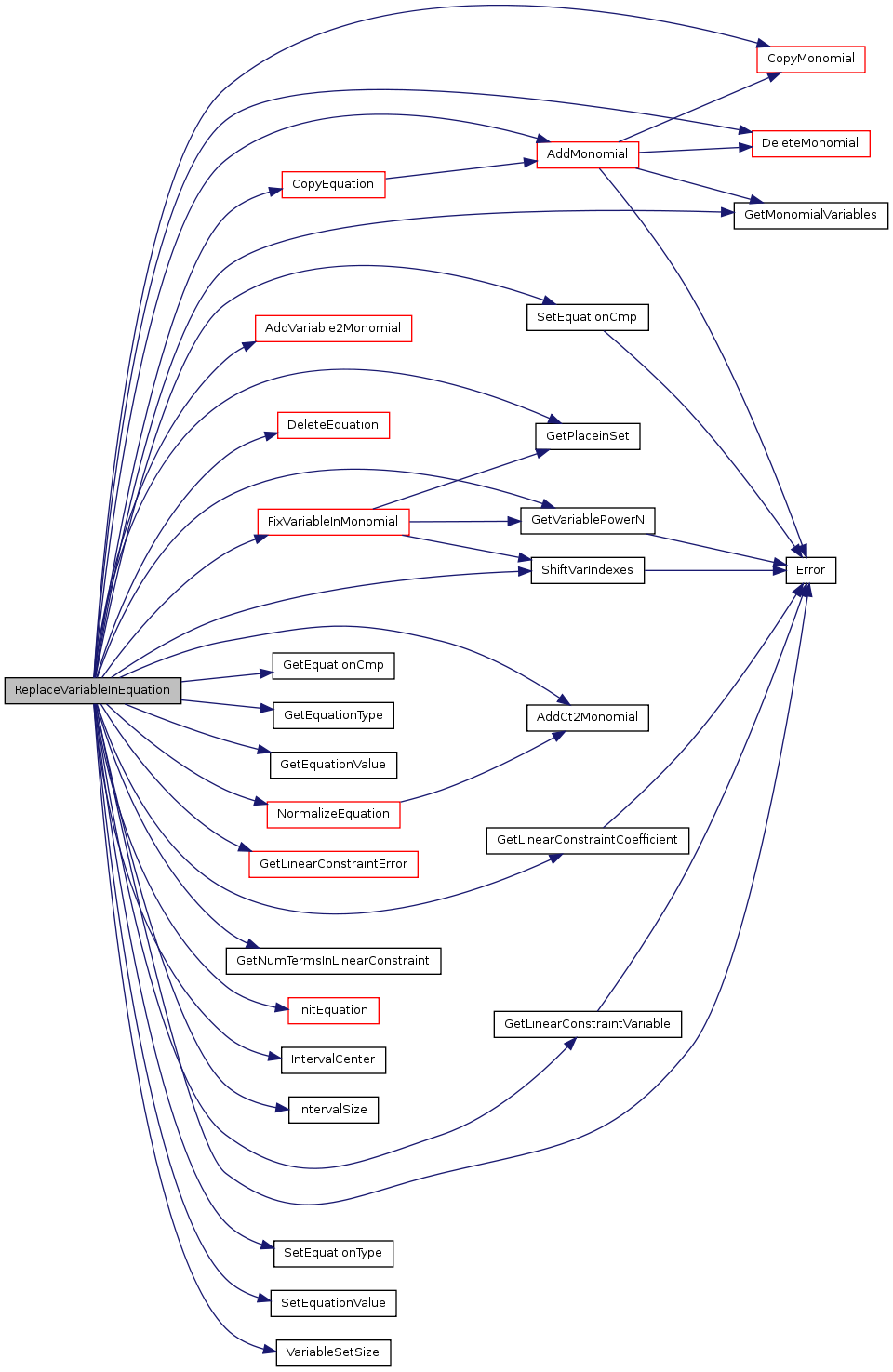
Here is the caller graph for this function:

Scales the equation by a constant factor. Only equalities are scaled and if the scale factor is 0 this function triggers an error.
Definition at line 485 of file equation.c. References AddCt2Monomial(), Tequation::cmp, EQU, Error(), Tequation::monomials, Tequation::nMonomials, Tequation::value, and ZERO.
Here is the call graph for this function:

Scales the equation by a variable factor. Only equalities are scaled.
Definition at line 502 of file equation.c. References AddCt2Monomial(), AddMonomial(), AddVariable2Monomial(), Tequation::cmp, DeleteMonomial(), EQU, Error(), GetMonomialVariables(), InitMonomial(), Tequation::monomials, Tequation::nMonomials, ResetVarSet(), UnionVarSet(), Tequation::value, and Tequation::vars.
Here is the call graph for this function:
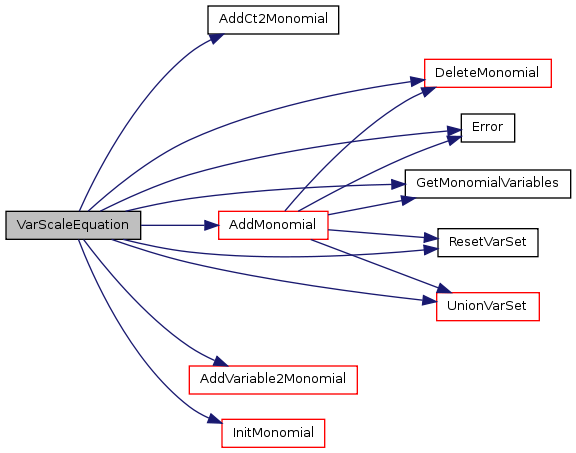
Simple form of normalization to avoid numerical inestabilities. If all monomials have the same ct (up to ZERO) we make them all equal to one. This helps in many cases when we replace variables to avoid transforming, for instance, a circle equation into a scaled circle equation (that is not identified as a circle!)
Definition at line 536 of file equation.c. References AddCt2Monomial(), Tequation::cmp, EQU, GetMonomialCt(), Tequation::monomials, Tequation::nMonomials, PurgeEquation(), SetMonomialCt(), TRUE, Tequation::value, and ZERO. Referenced by AddEquation(), and ReplaceVariableInEquation().
Here is the call graph for this function:
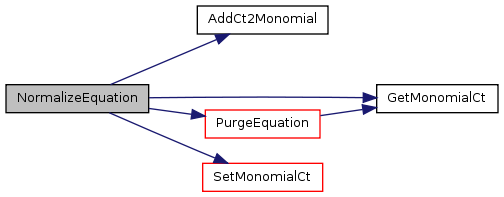
Here is the caller graph for this function:

Checks if a given variable can be remove from the system and replaced by a linear combination of the surving variables. The output variables (v and lc) are only initilized if some simplification is possible (i.e., if the return is TRUE).
Definition at line 585 of file equation.c. References AddCt2LinearConstraint(), AddTerm2LinearConstraint(), Tequation::cmp, EQU, FALSE, GetEquationOrder(), GetMonomialCt(), GetMonomialVariables(), GetVariableN(), INF, InitLinearConstraint(), InvertLinearConstraint(), MAX_TERMS_SIMP, Tequation::monomials, Tequation::nMonomials, NO_UINT, ScaleLinearConstraint(), TRUE, Tequation::value, VariableSetSize(), and Tequation::vars. Referenced by CSRemoveLCVars().
Here is the call graph for this function:
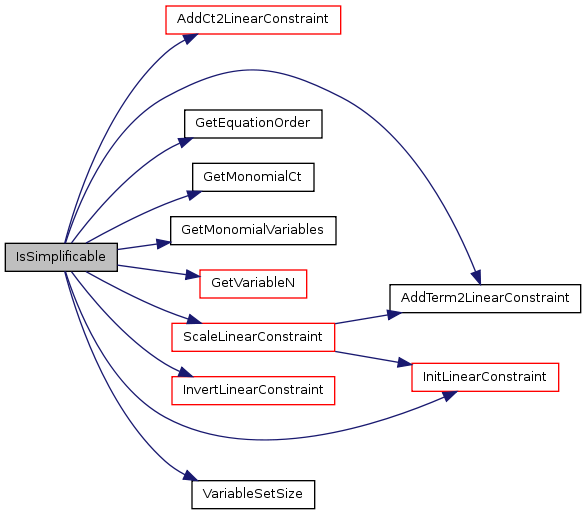
Here is the caller graph for this function:

Sets a new relational operator for the equation.
Definition at line 732 of file equation.c. References Tequation::cmp, EQU, Error(), GEQ, and LEQ. Referenced by AddTerm2SearchCriterion(), DummifyAndAddEquation(), GenerateCrossProductEquations(), GenerateDotProductEquation(), GenerateGeneralNormEquation(), GenerateJointEquations(), GenerateJointRangeEquations(), GenerateScaledParabolaEquation(), GenerateScaledSaddleEquation(), GenerateTransEquationsFromBranch(), and ReplaceVariableInEquation().
Here is the call graph for this function:

Here is the caller graph for this function:
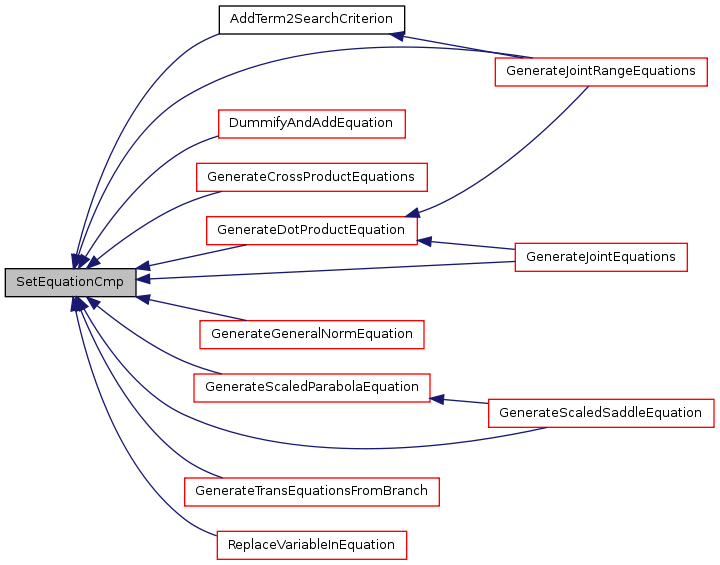
Sets a new type for the equation.
Definition at line 727 of file equation.c. References Tequation::type. Referenced by DummifyAndAddEquation(), GenerateCrossProductEquations(), GenerateDotProductEquation(), GenerateGeneralNormEquation(), GenerateJointEquations(), GenerateJointRangeEquations(), GenerateScaledParabolaEquation(), GenerateScaledSaddleEquation(), GenerateTransEquationsFromBranch(), and ReplaceVariableInEquation().
Here is the caller graph for this function:
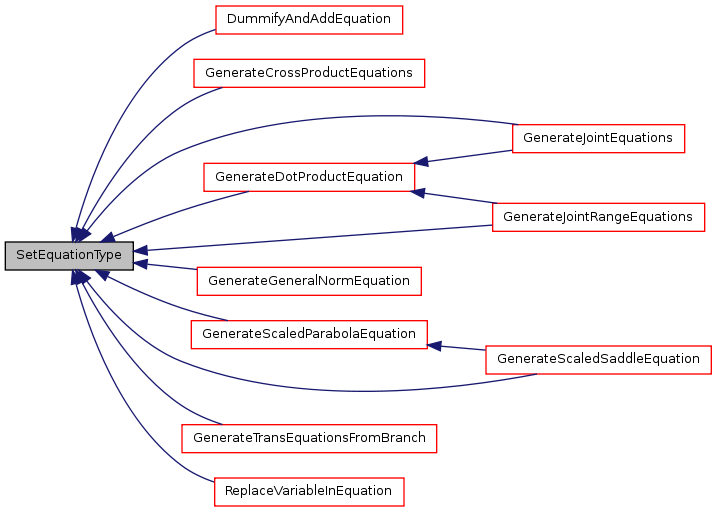
Sets a new rigth-hand value for the equation.
Definition at line 740 of file equation.c. References Tequation::value. Referenced by DummifyAndAddEquation(), GenerateCrossProductEquations(), GenerateDotProductEquation(), GenerateGeneralNormEquation(), GenerateJointRangeEquations(), GenerateScaledParabolaEquation(), GenerateScaledSaddleEquation(), and ReplaceVariableInEquation().
Here is the caller graph for this function:
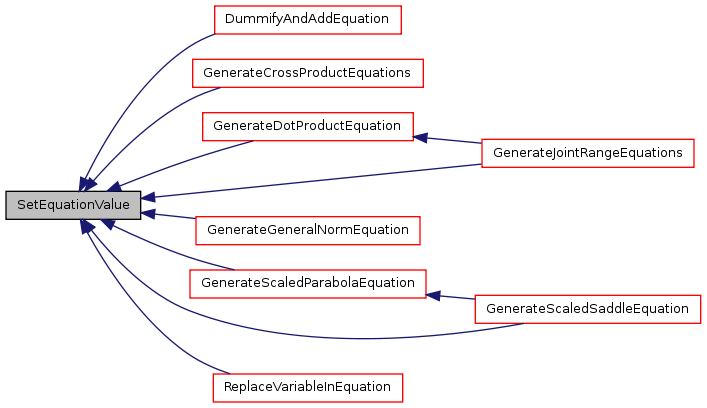 Identify linear equations.
Definition at line 745 of file equation.c. References CtMonomial(), LinearMonomial(), Tequation::monomials, and TRUE. Referenced by DummifyAndAddEquation(), and SetEquationInfo().
Here is the call graph for this function:

Here is the caller graph for this function:
 Identify bilinear equations.
Definition at line 758 of file equation.c. References BilinearMonomial(), CtMonomial(), LinearMonomial(), Tequation::monomials, QuadraticMonomial(), and TRUE.
Here is the call graph for this function:
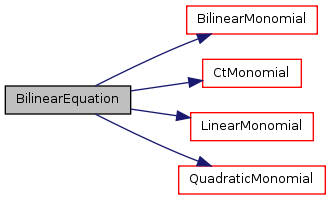 Identify circle equations.
Definition at line 777 of file equation.c. References FALSE, GetMonomialCt(), Tequation::monomials, Tequation::nMonomials, QuadraticMonomial(), TRUE, and Tequation::value. Referenced by DummifyAndAddEquation(), and SetEquationInfo().
Here is the call graph for this function:

Here is the caller graph for this function:
 Identify sphere equations.
Definition at line 792 of file equation.c. References Tequation::cmp, EQU, FALSE, GetMonomialCt(), Tequation::monomials, Tequation::nMonomials, QuadraticMonomial(), TRUE, and Tequation::value. Referenced by DummifyAndAddEquation(), and SetEquationInfo().
Here is the call graph for this function:

Here is the caller graph for this function:
 Identify scaled saddle equations, i.e., equations of the form
Definition at line 807 of file equation.c. References BilinearMonomial(), Tequation::cmp, EQU, FALSE, GetMonomialCt(), LinearMonomial(), Tequation::monomials, Tequation::nMonomials, TRUE, and Tequation::value. Referenced by DummifyAndAddEquation(), and SetEquationInfo().
Here is the call graph for this function:
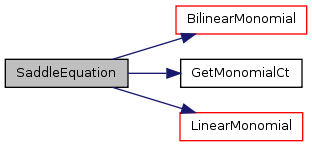
Here is the caller graph for this function:
 Identify parabola equations, i.e., equations of the form
Definition at line 821 of file equation.c. References Tequation::cmp, EQU, FALSE, GetMonomialCt(), LinearMonomial(), Tequation::monomials, Tequation::nMonomials, QuadraticMonomial(), TRUE, and Tequation::value. Referenced by DummifyAndAddEquation(), and SetEquationInfo().
Here is the call graph for this function:
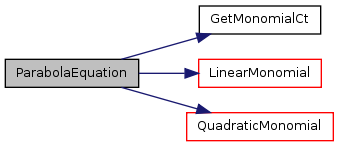
Here is the caller graph for this function:

Gets the type of relational operator of the equation.
Definition at line 835 of file equation.c. References Tequation::cmp. Referenced by AddEquation(), AddEquation2Simplex(), ComputeSimpCuikSystemJacobian(), CoordInequalitiesHold(), CropEquation(), DummifyAndAddEquation(), ErrorInInequalities(), ErrorInSolution(), GaussianElimination(), LinearizeCircleEquation(), LinearizeGeneralEquation(), ReplaceVariableInEquation(), and SetEquationInfo().
Here is the caller graph for this function:
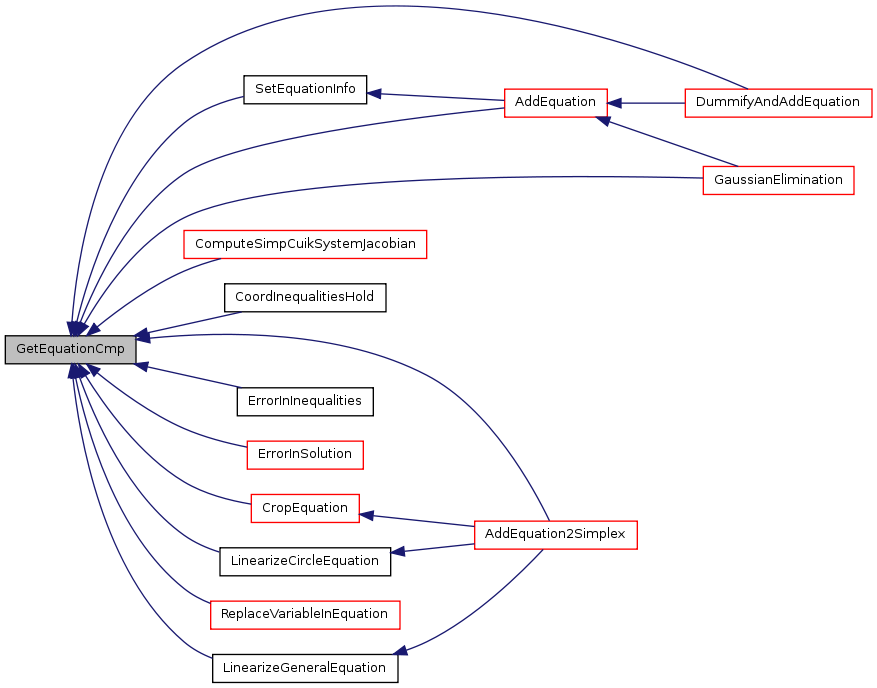
Gets the equation type.
Definition at line 840 of file equation.c. References Tequation::type. Referenced by AddEquation(), CoordInequalitiesHold(), DummifyAndAddEquation(), ErrorInSolution(), GaussianElimination(), GetEquationTypeN(), IsCoordEquation(), IsDummyEquation(), IsSystemEquation(), ReplaceVariableInEquation(), and UsedVarInNonDummyEquations().
Here is the caller graph for this function:
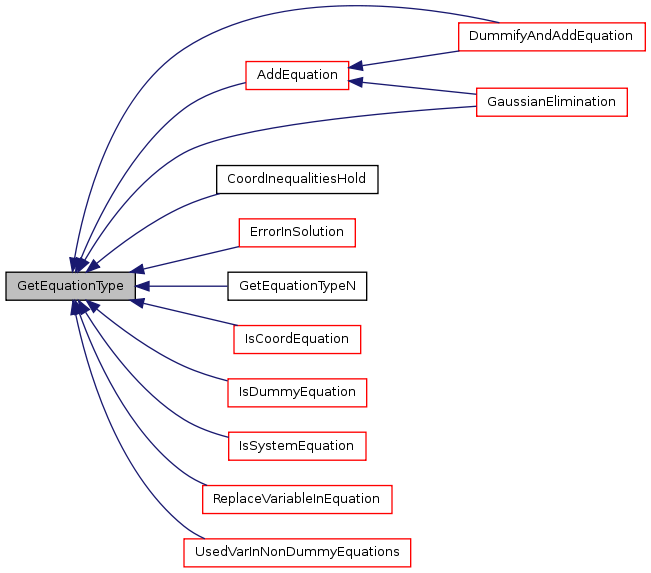
Gets the right-hand value of the equation.
Definition at line 845 of file equation.c. References Tequation::value. Referenced by AddEquation2Simplex(), CoordInequalitiesHold(), CropEquation(), DummifyAndAddEquation(), ErrorInInequalities(), ErrorInSolution(), EvaluateEqMin(), GetFirstOrderApproximationToEquation(), LinearizeCircleEquation(), LinearizeSphereEquation(), MoveWorld(), ReplaceVariableInEquation(), and SetEquationInfo().
Here is the caller graph for this function:
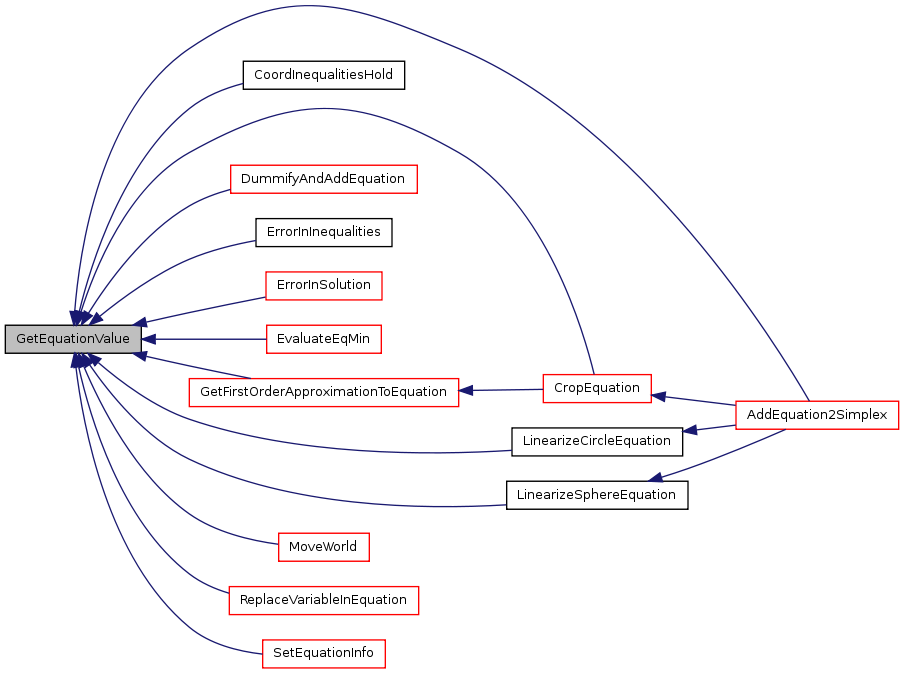
Gets the equation order: 1 for lineal, 2 for bilinear and quadratic.
Definition at line 850 of file equation.c. References Tequation::order. Referenced by CmpEquations(), IsSimplificable(), and LinearEquation2LinearConstraint().
Here is the caller graph for this function:
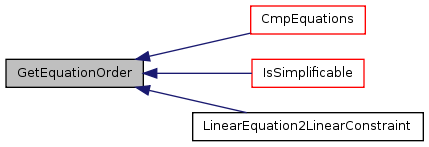
Gets the set of variables equation used in the equation. Note, we return a pointer to the interval equation structures so be careful what you do with the pointer.
Definition at line 855 of file equation.c. References Tequation::vars. Referenced by AddEquation2Simplex(), CropEquation(), DummifyAndAddEquation(), ErrorDueToVariable(), GetEquationNumVariables(), GetFirstOrderApproximationToEquation(), LinearizeCircleEquation(), LinearizeGeneralEquation(), LinearizeGeneralEquationInt(), LinearizeSphereEquation(), RemoveEquationsWithVar(), SetEquationInfo(), UpdateSplitWeight(), UsedVarInEquations(), and UsedVarInNonDummyEquations().
Here is the caller graph for this function:
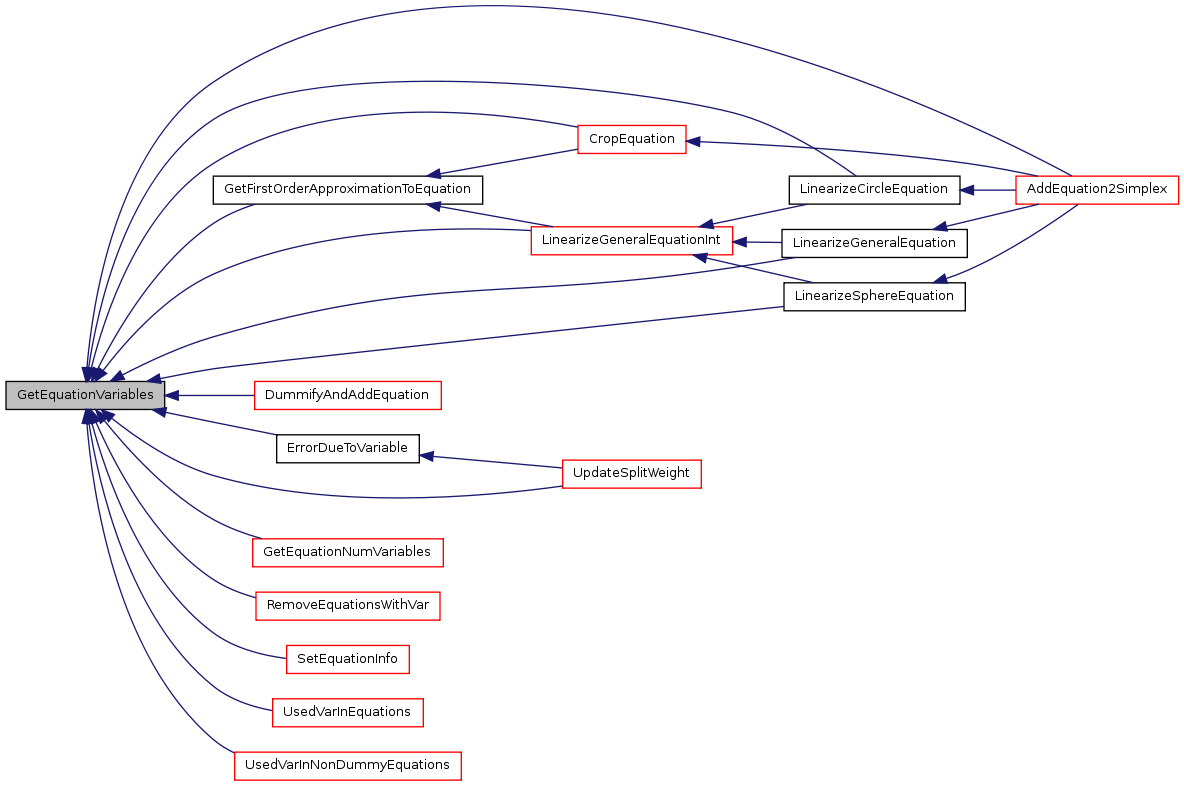
Gets the number of variables equation used in the equation.
Definition at line 860 of file equation.c. References GetEquationVariables(), and VariableSetSize(). Referenced by GaussianElimination().
Here is the call graph for this function:

Here is the caller graph for this function:
 Returns 1 if eq1<eq2, 0 if eq1=eq2 or 2 if eq1>eq2. Equations are sorted according to
Definition at line 865 of file equation.c. References Tequation::cmp, CmpMonomial(), GetEquationOrder(), Tequation::monomials, Tequation::nMonomials, Tequation::type, and Tequation::value. Referenced by AddEquation(), and HasEquation().
Here is the call graph for this function:

Here is the caller graph for this function:
 Adds a new monomial to the equation.
Definition at line 932 of file equation.c. References CmpMonomial(), CopyMonomial(), CtMonomial(), DeleteMonomial(), EmptyMonomial(), Error(), FindMonomial(), GetMonomialCt(), GetMonomialVariables(), Tequation::maxMonomials, MEM_DUP, MonomialOrder(), Tequation::monomials, NEW, Tequation::nMonomials, NO_UINT, Tequation::order, ResetVarSet(), SetMonomialCt(), UnionVarSet(), Tequation::value, Tequation::vars, and ZERO. Referenced by AccumulateEquations(), AddTerm2SearchCriterion(), ApplyLinkRot(), CopyEquation(), DeriveEquation(), DummifyAndAddEquation(), EquationFromLinearConstraint(), EquationFromLinearConstraintProduct(), GenerateCrossProductEquations(), GenerateDotProductEquation(), GenerateEquationsFromBranch(), GenerateGeneralNormEquation(), GenerateJointEquations(), GenerateJointEquationsInBranch(), GenerateJointRangeEquations(), GenerateScaledParabolaEquation(), GenerateScaledSaddleEquation(), PurgeEquation(), ReplaceVariableInEquation(), RewriteEquation(), and VarScaleEquation().
Here is the call graph for this function:
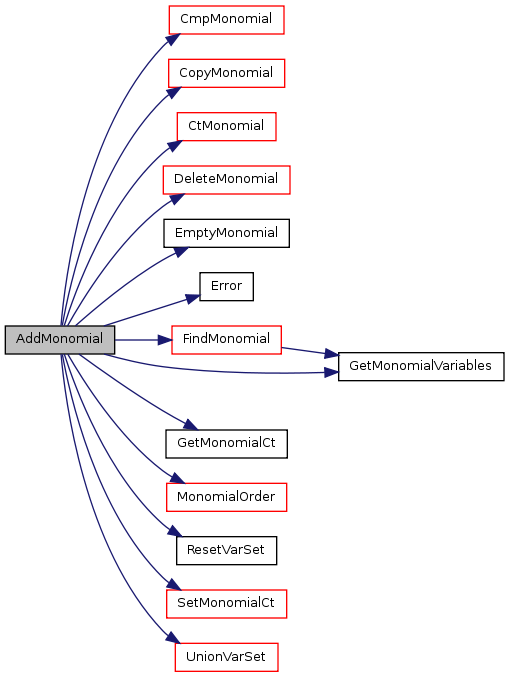
Here is the caller graph for this function:
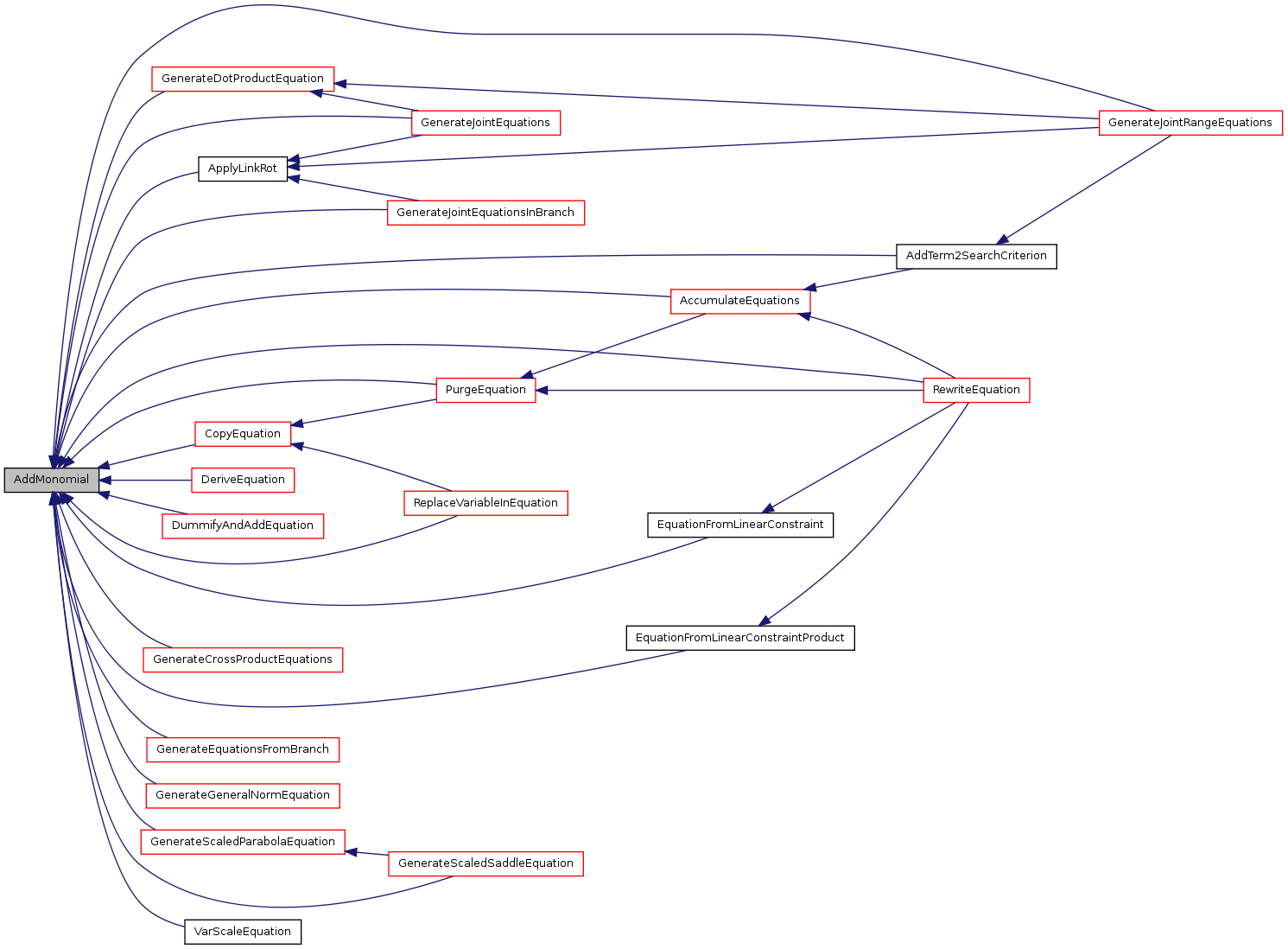
Generates a parabola equation vx^2-vy=0.
Definition at line 1010 of file equation.c. References GenerateScaledParabolaEquation().
Here is the call graph for this function:

Generates a parabola equation s*vx^2-vy=0.
Definition at line 1015 of file equation.c. References AddCt2Monomial(), AddMonomial(), AddVariable2Monomial(), DeleteMonomial(), DUMMY_EQ, EQU, Error(), InitEquation(), InitMonomial(), ResetMonomial(), SetEquationCmp(), SetEquationType(), and SetEquationValue(). Referenced by GenerateParabolaEquation(), and GenerateScaledSaddleEquation().
Here is the call graph for this function:
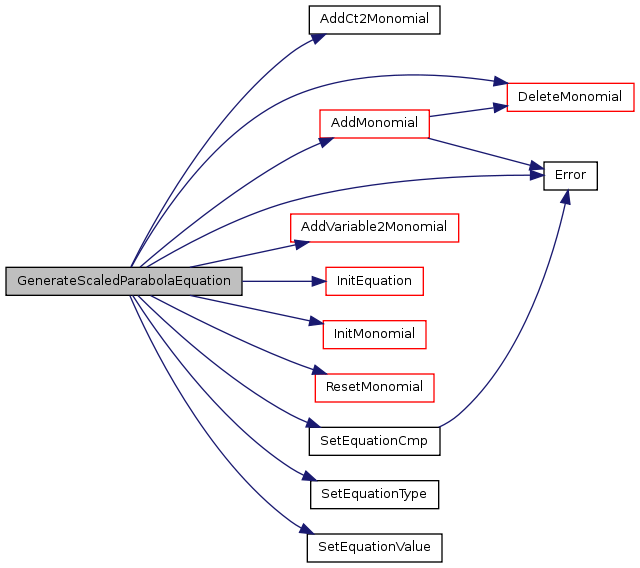
Here is the caller graph for this function:

Generates a saddle equation vx*vy-vz=0. If vx is the same as vy a parabola equation is generated.
Definition at line 1041 of file equation.c. References GenerateScaledSaddleEquation(). Referenced by GenerateJointEquations().
Here is the call graph for this function:

Here is the caller graph for this function:

Generates a saddle equation s*vx*vy-vz=0. If vx is the same as vy a scaled parabola equation is generated.
Definition at line 1047 of file equation.c. References AddCt2Monomial(), AddMonomial(), AddVariable2Monomial(), DeleteMonomial(), DUMMY_EQ, EQU, Error(), GenerateScaledParabolaEquation(), InitEquation(), InitMonomial(), ResetMonomial(), SetEquationCmp(), SetEquationType(), and SetEquationValue(). Referenced by GenerateSaddleEquation().
Here is the call graph for this function:
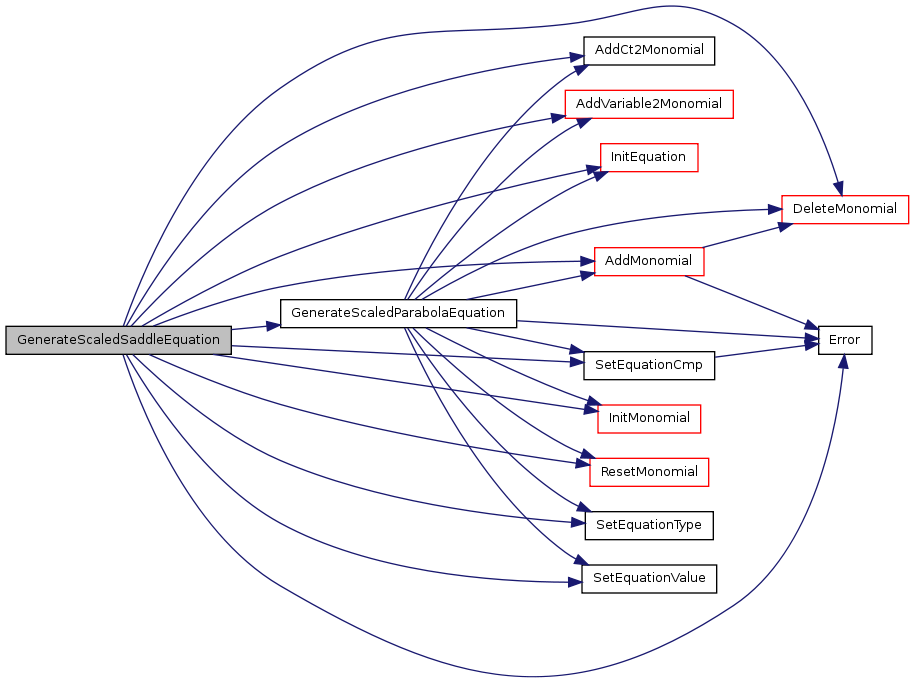
Here is the caller graph for this function:

Generates an equation that is the norm of a vector with nv variables n. Thus, the equation created is 
Definition at line 1092 of file equation.c. References AddMonomial(), AddVariable2Monomial(), DeleteMonomial(), EQU, InitEquation(), InitMonomial(), ResetMonomial(), SetEquationCmp(), SetEquationType(), SetEquationValue(), and SYSTEM_EQ. Referenced by GenerateNormEquation().
Here is the call graph for this function:
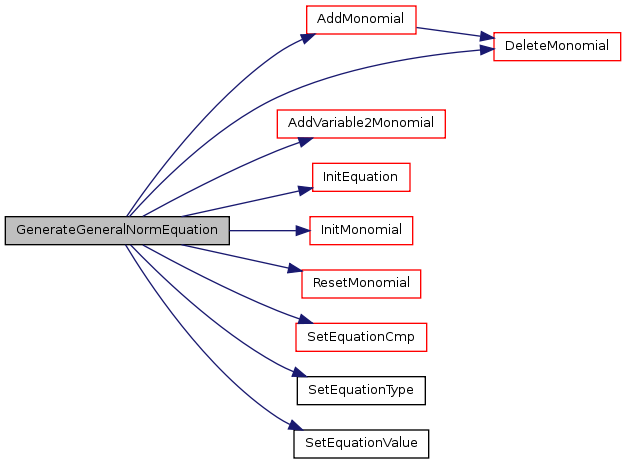
Here is the caller graph for this function:

This is a special case of GenerateGeneralNormEquation where the vector has only 3 variables.
Definition at line 1080 of file equation.c. References GenerateGeneralNormEquation(). Referenced by GenerateJointEquations(), and GenerateLinkRot().
Here is the call graph for this function:

Here is the caller graph for this function:

Generates the three equations of the cross product of two unitary vectors that give as a result a third vector (orthogonal to the two operated vectors) scaled by the sinus of the angle between these two vectors.
Definition at line 1113 of file equation.c. References AddCt2Monomial(), AddMonomial(), AddVariable2Monomial(), DeleteMonomial(), EQU, InitEquation(), InitMonomial(), NO_UINT, ResetMonomial(), SetEquationCmp(), SetEquationType(), SetEquationValue(), and SYSTEM_EQ. Referenced by GenerateLinkRot().
Here is the call graph for this function:

Here is the caller graph for this function:

Generates the equation corresponding to the dot product of two unitary vectors that give as a result the cosinus of the angle between these two vectors.
Definition at line 1175 of file equation.c. References AddCt2Monomial(), AddMonomial(), AddVariable2Monomial(), DeleteMonomial(), EQU, InitEquation(), InitMonomial(), NO_UINT, ResetMonomial(), SetEquationCmp(), SetEquationType(), SetEquationValue(), and SYSTEM_EQ. Referenced by GenerateJointEquations(), GenerateJointRangeEquations(), and GenerateLinkRot().
Here is the call graph for this function:
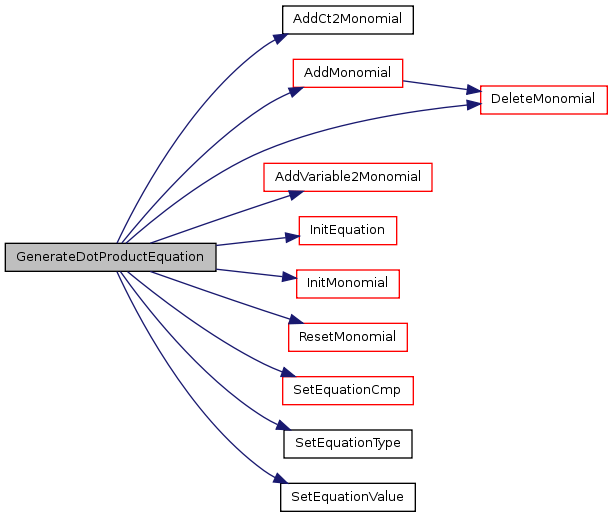
Here is the caller graph for this function:
 Searches for a given monomial in the equation.
Definition at line 1210 of file equation.c. References CmpVarSet(), FALSE, GetMonomialVariables(), Tequation::monomials, NO_UINT, and TRUE. Referenced by AddMonomial(), and GaussianElimination().
Here is the call graph for this function:

Here is the caller graph for this function:
 Gets a monomial from an equation.
Definition at line 1233 of file equation.c. References Tequation::monomials. Referenced by CropEquation(), DummifyAndAddEquation(), GaussianElimination(), LinearizeParabolaEquation(), LinearizeSaddleEquation(), and SetEquationInfo().
Here is the caller graph for this function:
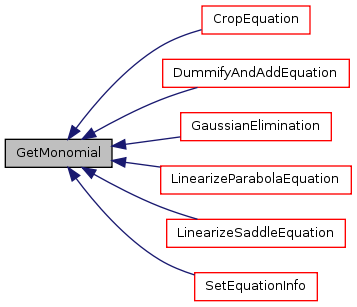
Returns the number of monomials in an equation.
Definition at line 1241 of file equation.c. References Tequation::nMonomials. Referenced by AddEquation(), CropEquation(), DummifyAndAddEquation(), GaussianElimination(), SetEquationInfo(), and UpdateCuikSystem().
Here is the caller graph for this function:
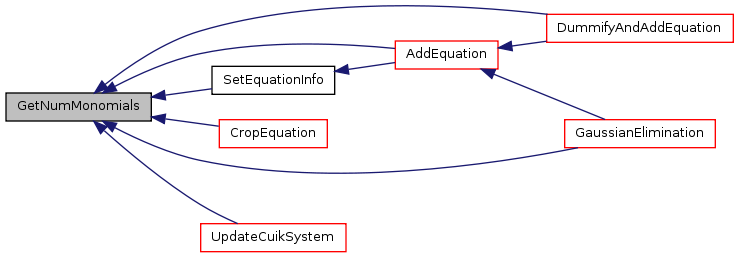
Converts a linear equation into a linear constraint. A linear constraint is just a particular case of equation. We implemented the linear constraints as a different type just for convenience (i.e., to facilitate the simplex implementation). If the input equation is not linear, the output is empty. To approximate a general equation with a linear constraint use GetFirstOrderApproximationToEquation.
Definition at line 1246 of file equation.c. References AddCt2LinearConstraint(), AddTerm2LinearConstraint(), GetEquationOrder(), GetMonomialCt(), GetMonomialVariables(), GetVariableN(), InitLinearConstraint(), Tequation::monomials, Tequation::nMonomials, and Tequation::value.
Here is the call graph for this function:
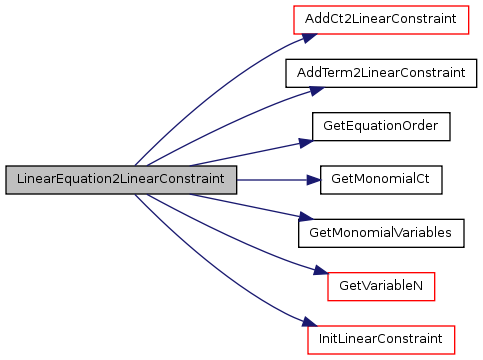
Evaluates an equation in a given point. NOTE: The right-hand side value of the equation is not used in the evaluation.
Definition at line 1264 of file equation.c. References Tequation::cmp, Error(), EvaluateMonomial(), Tequation::monomials, Tequation::nMonomials, and NOCMP. Referenced by ErrorInInequalities(), ErrorInSolution(), EvaluateEqMin(), and MoveWorld().
Here is the call graph for this function:

Here is the caller graph for this function:
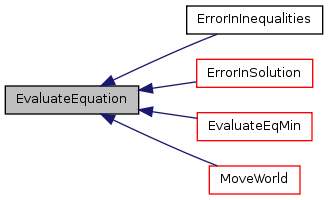 Evaluates an equation for a given ranges of the variables using interval arithmetics.
Definition at line 1280 of file equation.c. References Tequation::cmp, Error(), EvaluateMonomialInt(), IntervalAdd(), Tequation::monomials, NewInterval(), Tequation::nMonomials, and NOCMP. Referenced by AddEquation2Simplex(), CoordInequalitiesHold(), EvaluateEqMin(), and GetFirstOrderApproximationToEquation().
Here is the call graph for this function:
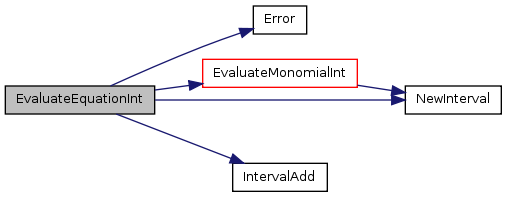
Here is the caller graph for this function:
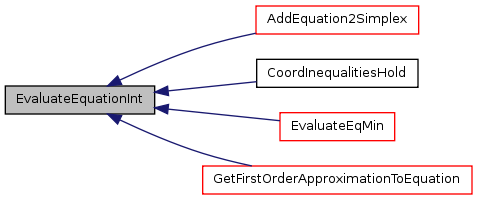 Derives an equation with respect to a given variable.
Definition at line 1296 of file equation.c. References AddMonomial(), Tequation::cmp, DeleteMonomial(), DERIVED_EQ, DeriveMonomial(), EQU, InitVarSet(), Tequation::maxMonomials, Tequation::monomials, NEW, Tequation::nMonomials, Tequation::order, Tequation::type, Tequation::value, and Tequation::vars. Referenced by ComputeSimpCuikSystemJacobian(), GetCuikSystemJacobian(), and SetEquationInfo().
Here is the call graph for this function:
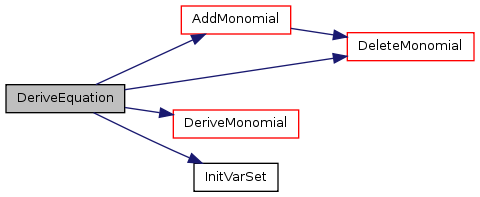
Here is the caller graph for this function:
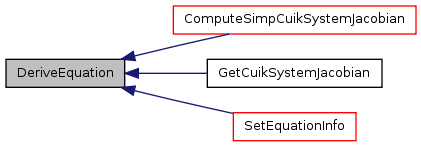
Writes an equation to a given stream as a sequence of monomials, i.e., without the equality and with the right-hand side at the left side. This only works if the equation is a equality. Inequalities are always printed as a normal equations
Definition at line 1322 of file equation.c. References Tequation::cmp, EQU, Tequation::monomials, Tequation::nMonomials, PrintEquation(), PrintMonomial(), Tequation::value, and ZERO. Referenced by PrintCuikSystem(), and PrintCuikSystemWithSimplification().
Here is the call graph for this function:

Here is the caller graph for this function:

Writes an equation to a given stream.
Definition at line 1339 of file equation.c. References Tequation::cmp, EQU, Error(), GEQ, LEQ, Tequation::monomials, Tequation::nMonomials, NOCMP, PrintMonomial(), and Tequation::value. Referenced by AddEquation2Simplex(), CropEquation(), PrintEquations(), and PrintMonomials().
Here is the call graph for this function:

Here is the caller graph for this function:
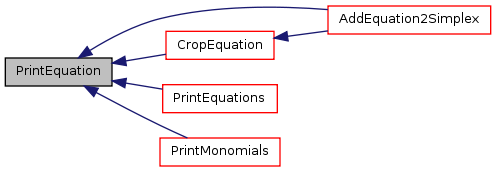
Deletes the information stored in the equation and frees the allocated memory space.
Definition at line 1365 of file equation.c. References DeleteVarSet(), Tequation::monomials, ResetEquationMonomials(), and Tequation::vars. Referenced by AddTerm2SearchCriterion(), DeleteCuikSystemJacobian(), DeleteEquationInfo(), DeleteSimpCuikSystemJacobian(), DeleteWorld(), DummifyAndAddEquation(), GaussianElimination(), GenerateEquationsFromBranch(), GenerateJointEquations(), GenerateJointRangeEquations(), GenerateLinkRot(), PurgeEquation(), ReplaceVariableInEquation(), RewriteEquation(), SetCSSearchMode(), SetEquationInfo(), and UnUpdateCuikSystem().
Here is the call graph for this function:

Here is the caller graph for this function:
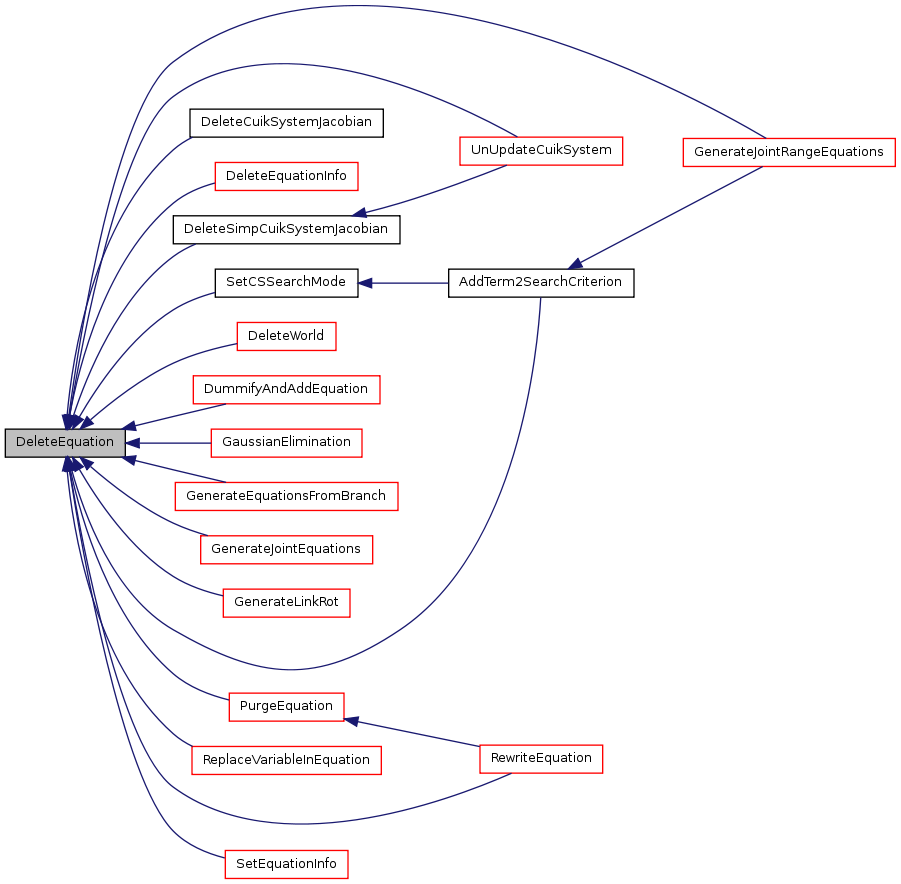 | |||||||||||||||||||||||||||||||||||||||||||||||||||||||||||||||||||||||||||||||||||||||||||||||||||||||||||||||||||||||||||||||||||||||||||||||||||||||||||||||||||||||||||||||||||||||||||||||||||||||||||||||||||||||||||||||||||||||||||||||||||||||||||||||||||||||||||||||||||||||||||||||||||||||||||||||||||||||||||||||||||||||||||||||||||||||||||||||||||||||||||||||||||||||||||||||||||||||||||||||||||||||||||||||||||||||||||||||||||||||||||||||||||||||||||||||||||||||||||||||||||||||||||||||||||||||||||||||||||||||||||||||||||||||||||||||||||||||||||||||||||||||||||||||||||||||||||||||||||||||||||||||||||||||||||||||||||||||||||||||||||||||||||||||||||||||||||||||||||||||||||||||||||||||||||||||||||||||||||||||||||||||||||||||||||||||||||||||||||||||||||||||||||||||||||||||||||||||||||||||||||||||||||||||||||||||||||||||||||||||||||||||||||||||||||||||||||||||||||||||||||||||||||||||||||||||||||||||||||||||||||||||||||||||||||||||||||||||||||||||||||||||||||||||||||||||||||||||||||||||